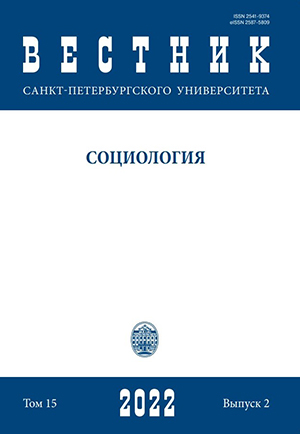Attitude of medical students to the study of physical and mathematical disciplines
DOI:
https://doi.org/10.21638/spbu12.2022.205Abstract
Using materials from a sociological study, this article explores features of the training of medical students in physical and mathematical disciplines. The issues are considered in the space of the intersection of several areas of sociological knowledge (problems of digital society and
digital economy, professional education, sociology of healthcare). In the course of the study, assumptions were made that the nature and activity of cognitive activity of medical students in the study of physical and mathematical disciplines are mainly due to three factors: first, the level of general education received, which affects a person’s ability to analyze and generalize; second, interests in physics and mathematics, based on the idea of the necessity of elements of physical and mathematical knowledge for a modern doctor; third, individual educational trajectories. As a result of this research, a typology of medical students’ orientations to the subject space of the physical and mathematical profile (physiology; diagnostics and physiotherapy; bioinformatics; photobiology and medical biophysics) is proposed, which is associated with the totality of those special courses that most interested them. Various orientations in the physical and mathematical field of students of different faculties (medical, pediatric, dental, pharmaceutical, preventive medicine) have been identified. It is shown that the interest of students of different faculties in special courses of the physics and mathematics cycle generally coincides with their professional interests. The most popular disciplines are the physical foundations of MRI and CT; laser radiation in medicine; the physical foundations of ultrasound methods; biophysics of pathological conditions; biophysics of organs and complex systems. Their choice is connected both with interest in new trends in medical science and with opportunistic considerations. The directions of increasing the interest of medical students in physical and mathematical knowledge are substantiated, which are directly dependent on their needs, motives, abilities, views and attitudes on the process of obtaining the profession of a doctor, as well as the faculty and the age of students.
Keywords:
medical students, physical and mathematical disciplines, training, digitalization, doctor, education, professional culture
Downloads
References
Downloads
Published
How to Cite
Issue
Section
License
Articles of "Vestnik of Saint Petersburg University. Sociology" are open access distributed under the terms of the License Agreement with Saint Petersburg State University, which permits to the authors unrestricted distribution and self-archiving free of charge.




